Mirrors are a common item found in many pet bird cages, but there is a growing concern among bird owners and experts that they can be bad for birds. Indeed, we often encounter the weird effect of a mirror on a bird.
However, the belief is that mirrors create a false perception of reality for birds, leading to territorial or hormonal aggression, as well as other psychological and physical problems.
This article will explore the various ways in which mirrors can be harmful to birds, and provide alternatives for proper bird enrichment. So, if you have a confusion about the mirror’s effect on birds, make sure to check the entire content.
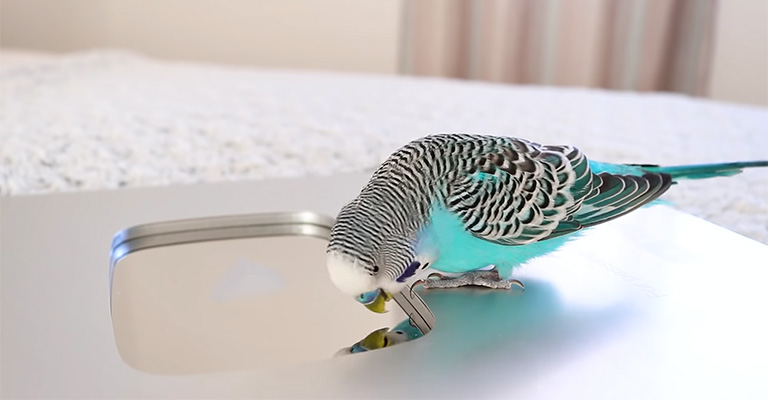
The Psychological Effects of Mirrors on Birds
There are some surprising psychological effects of mirrors on the birds. Some of them are briefly discussed below.
Perception of Another Bird
When birds see their reflection in a mirror, they often perceive it as another bird. This can lead to psychological effects such as territorial behavior and hormonal aggression.
The bird may view its reflection as an intruder in its territory and react accordingly. This can result in aggressive displays, vocalizations, and even physical attacks toward the mirror.
Obsessive Behavior
Some birds become fixated on their reflection in the mirror. They may spend excessive amounts of time preening, singing, or trying to interact with their reflection.
This obsession can lead to neglect of important behaviors like eating, drinking, and socializing with other birds or humans.
The bird may become so engrossed in the mirror image that it fails to engage in necessary activities for its overall health and well-being.
Decline in Health
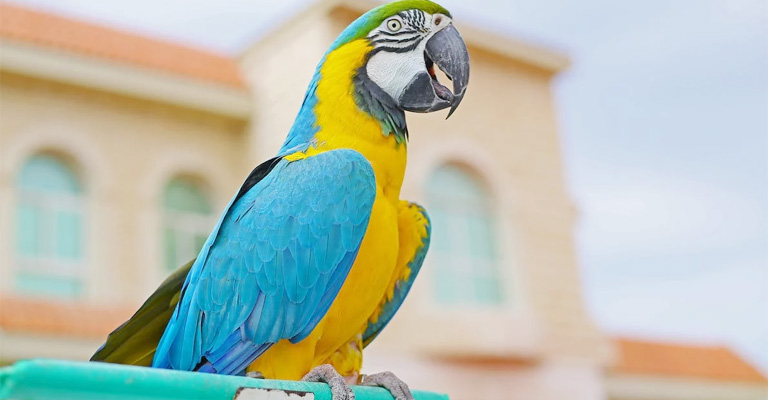
The obsessive focus on the mirror can have detrimental effects on a bird’s health. By neglecting essential behaviors, such as eating and drinking, the bird may suffer from malnutrition and dehydration.
Over time, this can lead to a decline in the overall physical condition and a weakened immune system. Additionally, the stress and anxiety associated with the mirror can negatively impact the bird’s mental health, further contributing to its decline.
Abnormal Behaviors
Birds experiencing mirror-induced psychological effects may exhibit abnormal behaviors as a result of their distress. Feather plucking, self-mutilation, and aggressive behavior towards other birds or humans are common manifestations.
The bird may redirect its frustration and aggression towards itself or others, causing harm and potential injury. These abnormal behaviors are a clear indication of the psychological distress the bird is experiencing.
Stress and Anxiety
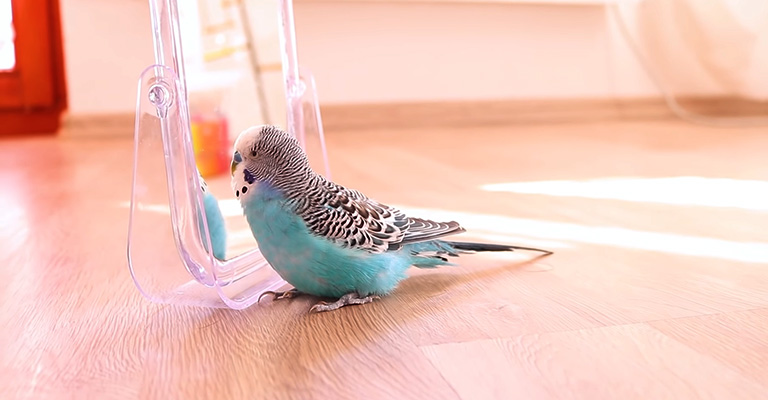
When birds are unable to interact with their reflection in the mirror, they may become stressed and anxious. The inability to establish dominance or interact with what they perceive as another bird can cause frustration and distress.
This can lead to heightened levels of stress hormones, impacting the bird’s overall well-being and potentially exacerbating any existing health conditions.
Risk of injury and death
In severe cases, mirror-induced psychological problems can escalate to the point where the bird’s life is at risk. If the bird becomes excessively obsessed with the mirror, it may engage in self-harming behaviors, such as pecking or attacking its own reflection. This can lead to injuries, infections, or even fatal consequences if left unchecked.
Individual Variations
It is important to note that not all birds react the same way to mirrors. Some birds may ignore their reflection or show minimal interest, while others can become highly affected.
Individual differences, species variations, and previous experiences may influence a bird’s response to mirrors. It is crucial to monitor a bird’s behavior closely when introducing a mirror and respond accordingly to ensure its well-being.
The Physical Effects of Mirrors on Birds
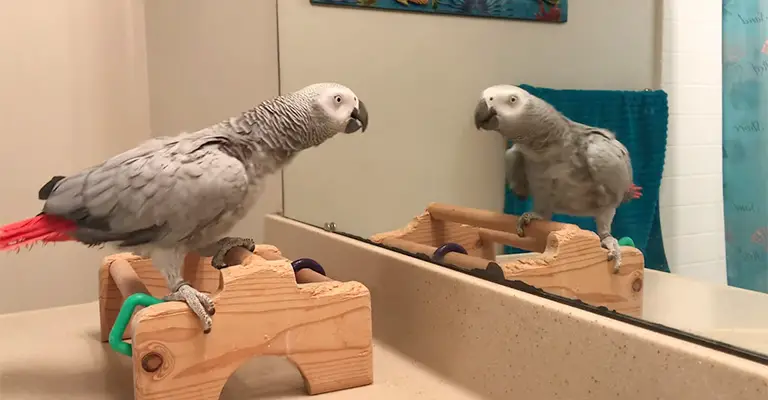
There are some physical effect that falls on the bird as the effect of the mirror. The following factors are essential to learn about in this case.
Lack of Physical Activity and Stimulation
Birds that become obsessed with their reflection in a mirror may spend excessive amounts of time preening, interacting, or displaying their mirror image.
This can result in a neglect of other important behaviors, including exercise and play. The lack of physical activity can lead to a decline in overall physical health and fitness, as well as an increased risk of obesity.
Without sufficient exercise and stimulation, birds may experience muscle weakness, decreased cardiovascular health, and reduced agility.
Increased Stress Levels
The inability to interact with the reflection in the mirror can cause heightened levels of stress in birds. Chronic stress can have a negative impact on their physical health. It can weaken the immune system, making them more susceptible to infections and diseases.
Stress can also lead to digestive issues, such as decreased appetite, vomiting, or diarrhea. Prolonged stress can even contribute to organ failure and other serious health complications.
Risk of Injury
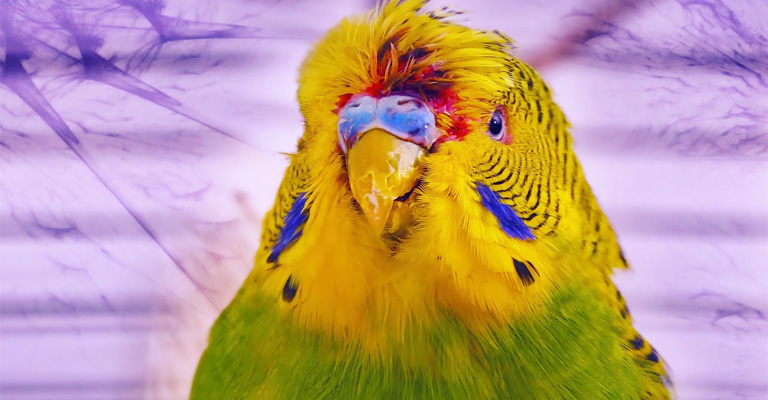
Birds may attempt to interact with their reflection in the mirror by pecking or flying toward it. This can result in injuries to their beak, wings, or other body parts.
The mirror is a hard surface, and collisions or pecking at it can cause bruises, cuts, or fractures. In severe cases, the bird may experience internal injuries or bleeding.
These injuries can be painful, require veterinary intervention, and in some instances, be life-threatening.
Distorted Social Interactions
When a bird becomes fixated on its reflection, it may prioritize interactions with the mirror over socializing with other birds or humans.
This can lead to a disruption in normal social behavior and potentially affect their overall well-being.
Social interaction is essential for the mental and emotional health of birds, and the absence of it can cause feelings of loneliness, isolation, and even depression.
Eye Strain
Constant focus on the mirror can strain a bird’s eyes. Birds have excellent vision, and continuously staring at their reflection can put unnecessary strain on their eye muscles and visual system.
Eye strain can lead to discomfort, and fatigue, and potentially affect their overall vision and perception.
Alternatives to Mirrors for Bird Enrichment
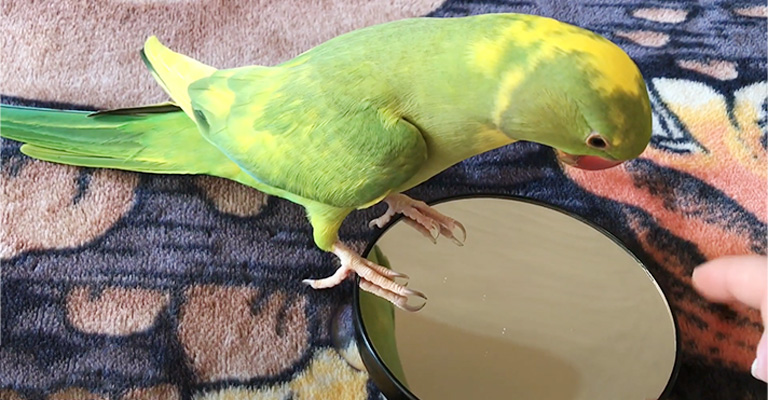
There are several alternatives to mirrors that can provide enrichment for pet birds:
Natural perches
Natural perches, such as branches from non-toxic trees or manzanita, offer birds a more varied and dynamic environment.
They provide opportunities for birds to exercise their feet and beak while mimicking their natural habitat. Having perches of different sizes and textures can further engage birds and keep them mentally and physically stimulated.
Toys and puzzles
Toys designed for birds can be excellent sources of enrichment. Swings, ladders, bells, and interactive toys can provide physical exercise and mental stimulation.
Puzzle toys that require the bird to manipulate or solve a challenge to access food or treats can also engage their natural foraging instincts.
Social interaction
Birds are social creatures and benefit greatly from interaction with their own species or with humans. If possible, providing a companion bird can help fulfill their social needs.
Regular social interaction with humans, such as gentle handling, talking, and spending time together, can also provide mental stimulation and prevent feelings of loneliness or boredom.
Playtime and training
Engaging birds in playtime activities can provide both physical and mental stimulation. Activities like flying in a safe, supervised area, learning new tricks or commands through positive reinforcement training, or playing games that involve interaction with their owners can keep birds active, engaged, and mentally challenged.
Environmental variety
Creating a diverse and stimulating environment for birds can also contribute to their enrichment. Offering different types of perches, providing hiding spots or cozy corners, introducing safe and engaging objects like shreddable toys, or even rotating the placement of toys and perches can help prevent boredom and encourage exploration.
Environmental enrichment
Mimicking elements of a bird’s natural habitat can enhance its well-being. This can include providing opportunities for bathing, offering safe and edible foliage or non-toxic plants for nibbling, and providing exposure to natural light and fresh air through supervised outdoor time or screened windows.
Comparison of Mirrors and Alternatives for Bird Enrichment
| Items | Advantages | Disadvantages |
| Mirrors | Can provide social interaction for birds living alone | This can lead to obsession and territorial/hormonal aggression |
| Natural perches | Mimic natural environment, provide exercise and beak stimulation | May not provide as much visual stimulation as mirrors |
| Toys and puzzles | Provide physical and mental stimulation | Some birds may not be interested |
| Social interaction with other birds or humans | Provide socialization and mental stimulation | Not always feasible for all bird owners |
It’s important to note that not all birds will react the same way to each enrichment option and it’s best to observe the bird’s behavior and provide a variety of options to keep them mentally and physically stimulated.
FAQs
It depends on the individual bird. Some birds may not be interested in mirrors at all, while others may become obsessed with them. It is best to observe the bird’s behavior when introduced to a mirror and remove it if it causes any problems. Additionally, it is important to provide other forms of enrichment such as natural perches and toys for the bird.
Mirrors can be harmful to all birds, but it is more common for smaller bird species such as parakeets and cockatiels to become obsessed with mirrors. However, it’s always important to monitor the bird’s behavior when introducing a mirror and remove it if it causes any problems.
While birds that live alone may benefit from some social interaction with their reflection, it’s important to consider the bird’s individual behavior and the potential negative effects it may have on its mental and physical health. If the bird is showing signs of obsession or aggression towards its reflection, it’s best to remove the mirror and provide other forms of enrichment.
It’s best to avoid mirrors with sharp edges or corners, as these can pose a risk of injury to the bird. Additionally, mirrors that are too small or too large may not be suitable for the bird’s cage.
Signs of obsession may include excessive preening, singing, or trying to interact with the reflection, neglecting other important behaviors such as eating and drinking. Additionally, if the bird becomes stressed or anxious when it is unable to interact with its reflection, it may be becoming obsessed. It’s important to monitor the bird’s behavior and remove the mirror if it causes any problems.
Wrapping Up
Mirrors can be a source of enrichment for birds, but they can also lead to obsession and territorial or hormonal aggression issues.
It’s important for bird owners to observe their birds’ behavior when introducing a mirror and remove it if it causes any problems.
Proper enrichment is essential for the overall health and well-being of pet birds. Alternatives to mirrors such as natural perches, toys and puzzles, and social interaction with other birds or humans can provide the same level of enrichment.
It will prevent the negative effects that mirrors can have on birds. Also, make sure to understand the potential dangers of mirrors for birds and provide a variety of enrichment options to keep their feathered friends mentally and physically stimulated.
You can ensure that your pet birds live happy and healthy lives by providing proper enrichment. Best of luck.